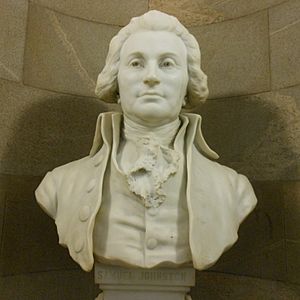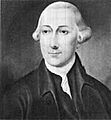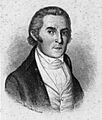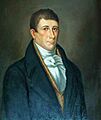Third North Carolina Provincial Congress facts for kids
Quick facts for kids Third North Carolina Provincial Congress (1775) |
|||||
|---|---|---|---|---|---|
|
|||||
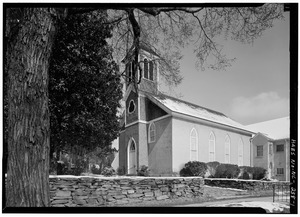
Hillsborough Presbyterian Church, site of the 3rd Congress
|
|||||
| Overview | |||||
| Legislative body | North Carolina Provincial Congress | ||||
| Jurisdiction | North Carolina, United States | ||||
| Meeting place | Hillsborough, North Carolina | ||||
| Term | 1775 | ||||
| Members | 213 Delegates (35 counties, 9 towns/districts) | ||||
| President | Samuel Johnston | ||||
| Secretary | Andrew Knox | ||||
| Assistant Secretary | James Glasgow | ||||
| Sessions | |||||
|
|||||
The Third North Carolina Provincial Congress was an important meeting in North Carolina's history. It was one of five special groups that met between 1774 and 1776. These groups helped North Carolina get ready to become an independent state.
They were like a temporary government. They created rules, printed money to pay for their efforts, and organized an army. This work helped set up the first official government of North Carolina in 1777.
The Third Congress met in Hillsborough. They gathered from August 20 to September 10, 1775. Samuel Johnston was chosen as their president. The previous president, John Harvey, had recently passed away.
Making New Laws for North Carolina
This congress had representatives from all 35 counties and nine towns in North Carolina. They officially declared themselves the main government. This happened after the British Governor, Josiah Martin, left. His departure meant the end of British rule in the area.
The last British-controlled assembly had met in April 1775. Governor Martin had then closed it down. The Third Congress stepped in to take charge.
The congress divided North Carolina into six military areas. These areas were for organizing local armies, called militias. They also helped decide who would represent each area on a new Provincial Council. The original districts were Edenton, Halifax, Hillsborough, New Bern, Salisbury, and Wilmington. Later, a seventh district, Morgan, was added for the western part of the state. A lot of their discussions were about keeping people safe. They also focused on getting ready for a war with Great Britain.
Setting Up a New Government
To lead North Carolina when the congress was not meeting, they chose a 13-member Provincial Council. This was the first executive group in North Carolina that was free from British control. Cornelius Harnett was chosen as the first president of this council.
Here are the people who were chosen for the Provincial Council:
- Samuel Johnston, Cornelius Harnett, and Samuel Ashe from the Wilmington District.
- Thomas Jones and Whitmell Hill from the Edenton District.
- Abner Nash and James Coor from the New Bern District.
- Thomas Person and John Kinchen from the Hillsborough District.
- Willie Jones and Thomas Eaton from the Halifax District.
- Samuel Spencer and Waightstill Avery from the Salisbury District.
The delegates also created a Committee of Safety for the entire state. They also picked members for local Committees of Safety in each military district. These committees were important for protecting people. They helped organize the local militias.
Here are some of the people chosen for the District Committees of Safety:
- Wilmington District: Frederick Jones, Sampson Mosely, Archibald Maclaine, Richard Quince, Thomas Davis, William Cray, Henry Rhodes, Thomas Routledge, James Kenan, Alexander McAlister, George Mylne, John Smith and Benjamin Stone.
- Edenton District: Luke Sumner, William Gray, John Johnston, Thomas Benbury, Gideon Lamb, Joseph Jones, Miles Harvey, Lawrence Baker, Kenneth McKinzie, Stevens Lee, Charles Blount, Isaac Gregory and Day Ridley.
- Hillsborough District: William Taylor, Joseph Taylor, Samuel Smith, John Atkinson, John Butler, William Johnston, John Hinton, Joel Lane, Michael Rogers, Ambrose Ramsey, Mial Scurlock, John Thompson and John Lark.
- New Bern District: John Easton, Major Croom, Roger Ormond, Edward Salter, George Barrow, William Thomson, William Tisdale, Benjamin Williams, Richard Ellis, Richard Cogdell, William Brown, James Glasgow and Alexander Gaston.
- Salisbury District: John Crawford, James Auld, Hezekiah Alexander, Benjamin Patten, John Brevard, Griffith Rutherford, William Hill, John Hamlin, Charles Galloway, William Dent, Robert Ewart and Maxwell Chambers.
- Halifax District: James Leslie, John Bradford, David Sumner, Allen Jones, William Eaton, Drury Gee, John Norwood, the Revd Henry Pattillo, James Mills, William Bellamy, William Haywood, Duncan Lamon and John Webb.
Images for kids
 | Georgia Louise Harris Brown |
 | Julian Abele |
 | Norma Merrick Sklarek |
 | William Sidney Pittman |


